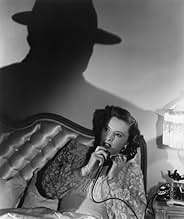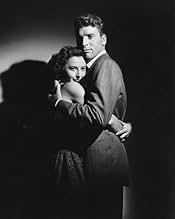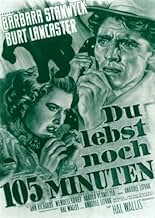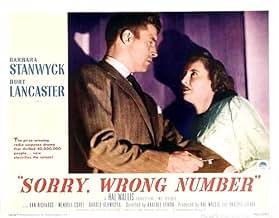CALIFICACIÓN DE IMDb
7.3/10
13 k
TU CALIFICACIÓN
Mientras habla por teléfono, una mujer inválida escucha lo que cree que es un complot de asesinato e intenta evitarlo.Mientras habla por teléfono, una mujer inválida escucha lo que cree que es un complot de asesinato e intenta evitarlo.Mientras habla por teléfono, una mujer inválida escucha lo que cree que es un complot de asesinato e intenta evitarlo.
- Nominado a 1 premio Óscar
- 3 premios ganados y 3 nominaciones en total
Bill Cartledge
- Page Boy
- (sin créditos)
Cliff Clark
- Police Sergeant Duffy
- (sin créditos)
Joyce Compton
- Cotterell's Blonde Girlfriend
- (sin créditos)
Ashley Cowan
- Clam Digger
- (sin créditos)
Yola d'Avril
- French Maid
- (sin créditos)
Suzanne Dalbert
- Cigarette Girl
- (sin créditos)
Opiniones destacadas
A woman confined to a bed overhears a murder plot on a crossed telephone line and tries to alert the police. The plot structure is quite convoluted, with most of the story told in flashbacks. In fact there are flashbacks within flashbacks, making it somewhat hard to follow. The audience is supposed to feel sympathy for Stanwyck, but the character is too self-centered and whiny for that to happen. Given her character's propensity for histrionics, the actress manages to keep her performance somewhat controlled; Lancaster is fine as her trophy husband. Litvak creates a good film noir atmosphere, although at times his camera roams aimlessly, becoming a distraction.
Sorry, Wrong Number (1948)
You can tell this thriller was once a radio play--it is mostly talk, and often over the telephone. But what drama can be built on a string of conversations around the office, in cars in the rain, out on a lonely beach on Staten Island, and on the telephone, often filled with mystery and doom.\
Not that it's not a visual movie, either. There is a big gloomy house, and lots of dark city streets. Shadows and moving camera and close-ups of faces and telephones, all keep you glued and increasingly worried. By the end, the really jarring, memorable end, you are ready for what you can never be ready for.
Beware, the plot is confusing. Even seeing it twice I had to pay attention to who was who, and what turn of events had just taken place. Part of the reason is there is a bewildering use of flashbacks, even flashbacks within flashbacks, told by all kinds of different characters. The plot is laid out methodically, but take notes as you go, or at least take note. The initial overheard phone call is key to it all, and it gets reinforced later somewhat, but pay heed there.
And the person on the phone? A sharp, bitter, convincing Barbara Stanwyck, who really knows how to be steely and vulnerable at the same time. Burt Lancaster is more solid and stolid, and maybe less persuasive overall, but he carries a more practical part of the story. It keeps coming back to Stanwyck in bed, and the telephone which is her contact with the facts, as they swirl and finally descend.
Director Anatole Litvak has some less known but thrilling dark dramas to look for, including Snake Pit. But this is his most sensational winner, partly for Stanwyck, and partly for the last five minutes, which is as good as drama gets.
You can tell this thriller was once a radio play--it is mostly talk, and often over the telephone. But what drama can be built on a string of conversations around the office, in cars in the rain, out on a lonely beach on Staten Island, and on the telephone, often filled with mystery and doom.\
Not that it's not a visual movie, either. There is a big gloomy house, and lots of dark city streets. Shadows and moving camera and close-ups of faces and telephones, all keep you glued and increasingly worried. By the end, the really jarring, memorable end, you are ready for what you can never be ready for.
Beware, the plot is confusing. Even seeing it twice I had to pay attention to who was who, and what turn of events had just taken place. Part of the reason is there is a bewildering use of flashbacks, even flashbacks within flashbacks, told by all kinds of different characters. The plot is laid out methodically, but take notes as you go, or at least take note. The initial overheard phone call is key to it all, and it gets reinforced later somewhat, but pay heed there.
And the person on the phone? A sharp, bitter, convincing Barbara Stanwyck, who really knows how to be steely and vulnerable at the same time. Burt Lancaster is more solid and stolid, and maybe less persuasive overall, but he carries a more practical part of the story. It keeps coming back to Stanwyck in bed, and the telephone which is her contact with the facts, as they swirl and finally descend.
Director Anatole Litvak has some less known but thrilling dark dramas to look for, including Snake Pit. But this is his most sensational winner, partly for Stanwyck, and partly for the last five minutes, which is as good as drama gets.
Barbara Stanwyck is marvellous! Although she's a rather unlikeable character, she thoroughly captivates your emotions. She drags you completely into her nightmare - you can't look away and like a real nightmare, the sense of not being in control is chillingly real.
Apart from the flashbacks, which epitomise the film noir tropes of the late forties, this film is Barbara Stanwyck alone and scared and trapped in her trappings of wealth. She's confined in the physical and mental luxury jail cell she's made for herself. It's an exceptional performance of a woman in despair driven to the edge, of knowing something awful is about to happen but not being able to do anything about it. It's a perfect example of how a film can stretch out tension and suspense tighter and more intense with each passing minute.
And I also loved it when in one of the flashbacks, Fred shouts to his wife: Hey Sally, Joe wants a bottle of beer and she obligingly dashes out to the shop: oh how 1940s!
Apart from the flashbacks, which epitomise the film noir tropes of the late forties, this film is Barbara Stanwyck alone and scared and trapped in her trappings of wealth. She's confined in the physical and mental luxury jail cell she's made for herself. It's an exceptional performance of a woman in despair driven to the edge, of knowing something awful is about to happen but not being able to do anything about it. It's a perfect example of how a film can stretch out tension and suspense tighter and more intense with each passing minute.
And I also loved it when in one of the flashbacks, Fred shouts to his wife: Hey Sally, Joe wants a bottle of beer and she obligingly dashes out to the shop: oh how 1940s!
Chrome-plated hokum, Sorry, Wrong Number works despite itself. And works and works. Starting out as a radio drama by Lucille Fletcher in the 1940s, it boasted umpteen performances plus a 1946 production in the nascent medium of television before Anatole Litvak turned it into film noir. During most of its earlier incarnations, Agnes Moorehead created the role of the hysterical, bedridden heiress, the `cough drop queen,' but the film fell into the lap of the First Lady of Film Noir, Barbara Stanwyck. Moorehead was more than a strong enough actress, but Hollywood required a star.
The Irony is that Sorry, Wrong Number is far from her finest hour on screen. Rarely has one been made so aware of Stanwyck `acting' in the most unabashedly actressy way. And the same can be said of Burt Lancaster who, when a role didn't set well with him, communicated his discomfort blatantly. In The Rose Tattoo, against Anna Magnani, he was ingratiating and unconvincing ; here, he's almost as awkward as the henpecked husband in whom the worm has at long last turned.
But maybe Fletcher's slice of devil's food cake calls for mannered histrionics. Ensconced in her bedchamber one sweltering Manhattan evening, her pill bottles and her telephone at her elbow, Stanwyck eavesdrops on a sinister conversation a murder is being plotted thanks to a crossed line. This makes her even more restive, and she starts working the phone, tracking down her tardy husband. Litvak `ventilates' these calls, turning them into a series of flashbacks filling in the background to what will prove a very bad evening for Stanwyck. (The sequences on Staten Island, however, could have sprung from the pen of Franklin W. Dixon, the Hardy Boys' puppeteer.)
Unavoidably talky, owing to its source, Sorry, Wrong Number moves inexorably to its preordained end. Basically, it's a gimmick, and one that Hitchcock might have fine-tuned into a nifty infernal machine. Litvak doesn't do badly, though, and the movie's shock value outlasts its staled conventions. Its most chilling moment comes when Stanwyck frantically dials a number that she thinks will give her solace. But her answer is `BOwery 2-1000 the City Morgue.'
The Irony is that Sorry, Wrong Number is far from her finest hour on screen. Rarely has one been made so aware of Stanwyck `acting' in the most unabashedly actressy way. And the same can be said of Burt Lancaster who, when a role didn't set well with him, communicated his discomfort blatantly. In The Rose Tattoo, against Anna Magnani, he was ingratiating and unconvincing ; here, he's almost as awkward as the henpecked husband in whom the worm has at long last turned.
But maybe Fletcher's slice of devil's food cake calls for mannered histrionics. Ensconced in her bedchamber one sweltering Manhattan evening, her pill bottles and her telephone at her elbow, Stanwyck eavesdrops on a sinister conversation a murder is being plotted thanks to a crossed line. This makes her even more restive, and she starts working the phone, tracking down her tardy husband. Litvak `ventilates' these calls, turning them into a series of flashbacks filling in the background to what will prove a very bad evening for Stanwyck. (The sequences on Staten Island, however, could have sprung from the pen of Franklin W. Dixon, the Hardy Boys' puppeteer.)
Unavoidably talky, owing to its source, Sorry, Wrong Number moves inexorably to its preordained end. Basically, it's a gimmick, and one that Hitchcock might have fine-tuned into a nifty infernal machine. Litvak doesn't do badly, though, and the movie's shock value outlasts its staled conventions. Its most chilling moment comes when Stanwyck frantically dials a number that she thinks will give her solace. But her answer is `BOwery 2-1000 the City Morgue.'
Barbara Stanwyck (as Leona Stevenson) is a neurotic woman, confined to her bed. She is married to the very attractive, and mysterious, young Burt Lancaster (as Henry Stevenson). Ms. Stanwyck relies on a state-of-the-art 1940s corded telephone to help communicate her needs. One evening, she picks up her phone and overhears two men plotting a murder; eventually, the crime moves too close to Stanwyck for comfort
Stanwyck is excellent as the spoiled, arrogant, and wealthy, but, ultimately, helpless heroine of Lucille Fletcher's adapted radio play (the part was originated on radio by Agnes Moorehead). The story picks up some flaws in its extension into a feature film; it is most frustrating as (flashbacks) ((within flashbacks)) (((within flashbacks))) occur; and, the story becomes a little confusing. Still, Stanwyck's fine performance carries the film to an exciting, tense, conclusion.
******** Sorry, Wrong Number (9/1/48) Anatole Litvak ~ Barbara Stanwyck, Burt Lancaster, Wendell Corey
Stanwyck is excellent as the spoiled, arrogant, and wealthy, but, ultimately, helpless heroine of Lucille Fletcher's adapted radio play (the part was originated on radio by Agnes Moorehead). The story picks up some flaws in its extension into a feature film; it is most frustrating as (flashbacks) ((within flashbacks)) (((within flashbacks))) occur; and, the story becomes a little confusing. Still, Stanwyck's fine performance carries the film to an exciting, tense, conclusion.
******** Sorry, Wrong Number (9/1/48) Anatole Litvak ~ Barbara Stanwyck, Burt Lancaster, Wendell Corey
¿Sabías que…?
- TriviaAnatole Litvak: Where Henry is having lunch with Sally, he asks his waiter if he knows who the gentleman is in the dark glasses at the table behind him. It is the director.
- ErroresTwice, Leona turns on a radio, and music begins instantly and strongly. Radios of the film's era contained vacuum tubes that needed some time to warm up.
- Citas
Henry Stevenson: [to Leona] I want you to do something. I want you to get yourself out of the bed, and get over to the window and scream as loud as you can. Otherwise you only have another three minutes to live.
- Créditos curiososPROLOGUE: "In the tangled networks of a great city, the telephone is the unseen link between a million lives...It is the servant of our common needs-the confidante of our inmost secrets...life and happiness wait upon its ring...and horror...and loneliness...and...death!!!"
- ConexionesEdited into Cliente muerto no paga (1982)
Selecciones populares
Inicia sesión para calificar y agrega a la lista de videos para obtener recomendaciones personalizadas
- How long is Sorry, Wrong Number?Con tecnología de Alexa
Detalles
- Fecha de lanzamiento
- País de origen
- Idioma
- También se conoce como
- Sorry, Wrong Number
- Locaciones de filmación
- Hollywood, California, Estados Unidos(telephone switchboard at a telephone company office on Gower St.)
- Productora
- Ver más créditos de la compañía en IMDbPro
Taquilla
- Total a nivel mundial
- USD 1,974
- Tiempo de ejecución1 hora 29 minutos
- Color
- Relación de aspecto
- 1.37 : 1
Contribuir a esta página
Sugiere una edición o agrega el contenido que falta

Principales brechas de datos
What is the Brazilian Portuguese language plot outline for Al filo de la noche (1948)?
Responda




































